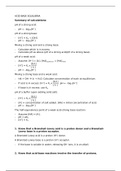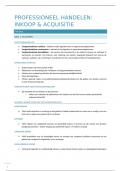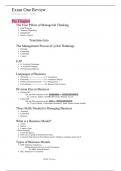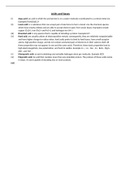Summary of calculations:
pH of a strong acid:
- pH = –log10[H+]
pH of a strong base:
- [H+] = Kw ÷ [OH-]
- pH = –log10[H+]
Mixing a strong acid and a strong base:
- Calculate which is in excess.
- Calculate pH as above (pH of a strong acid/pH of a strong base).
pH of a weak acid:
- Assume: [H+] = [A-], [HA]equilibrium = [HA]initial.
[HA]
- [H+] = Ka x -
[A ]
- pH = –log10[H+]
Mixing a strong base and a weak acid:
- HA + OH- A- + H2O. Calculate concentration of each at equilibrium.
[HA]
- If acid is in excess: [H+] = Ka x , pH = –log10[H+]
[ A- ]
- If base is in excess: use Kw
pH of a buffer (upon adding solid salt):
[HA]
- [H+] = Ka x
[ A- ]
- [A-] = concentration of salt added. [HA] = initial concentration of acid.
- pH = –log10[H+]
The half-equivalence point of a weak acid-strong base reaction:
- Assume [HA] = [A-].
- pH = pKa
- [H+] = Ka
1. Know that a Brønsted–Lowry acid is a proton donor and a Brønsted–
Lowry base is a proton acceptor.
A Bronsted–Lowry acid is a proton (H+) donor.
A Bronsted–Lowry base is a proton (H+) acceptor.
- If the base is soluble in water, releasing OH - ions, it is an alkali.
2. Know that acid-base reactions involve the transfer of protons.
, A Bronsted-Lowry acid-base reaction – a reaction involving the transfer of
protons.
- HCl + NaOH ⇌ H2O + NaCl:
- The acid is HCl and the base is NaOH.
o We can write the ionic equation as H+ + OH- ⇌ H2O.
o The Cl- and Na+ are spectator ions.
- A proton (H+) is transferred from the acid to the base.
3. Be able to identify Brønsted–Lowry conjugate acid-base pairs.
Conjugate acid-base pairs – two compounds, one acid and one base, that can be
transformed from one to the other by transfer of protons.
- After an acid donates a proton, it becomes a conjugate base.
o The conjugate base can accept a proton to become the acid again.
o E.g. CH3COOH (aq) ⇌ CH3COO- (aq) + H+ (aq)
o The acid is ethanoic acid here, and the conjugate base is the ethanoate
ion.
- After a base accepts a proton, it becomes a conjugate acid.
o The conjugate acid can donate a proton to become the base again.
o E.g. NH3 (aq) + H+ (aq) ⇌ NH4+ (aq)
o The base is ammonia here, and the conjugate acid is the ammonium
ion.
4. Be able to define the term ‘pH.’
pH is a measure of the hydrogen ion concentration of a solution.
- pH = – log10[H+ (aq)]
- We use a logarithmic scale as there is such a large range of H +
concentrations. This makes numbers more manageable for calculations and
means that pH usually lies between 0 to 14.
- pH has no units.
- The higher the pH, the lower the concentration of protons (and vice versa).
- pH does not tell us about the strength of the acid; it only tells us about the
concentration of H+.
5. Be able to calculate pH from hydrogen ion concentration.
Use the equation pH = – log10[H+ (aq)]:
- The concentration of protons in a solution is 0.1 mol dm -3.
o pH = – log10[0.1] = 1.
- When the concentration of protons increases tenfold, pH decreases by one
unit.
6. Be able to calculate the concentration of hydrogen ions, in mol dm-3,
in a solution from its pH, using the expression [H+] = 10–pH.










